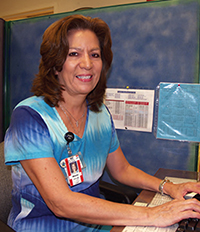 Why did you choose your specific health professional career?
Why did you choose your specific health professional career?
When I think about why I chose my health professional career, I would have to say that my mother had a lot to do with my decision. My mother was an LPN (Licensed Practical Nurse) who had a great influence on me while growing up. I think that is what led me into the health field. My decision to go into nursing came in a little bit later.
What experiences did you have to make sure this profession was right for you?
When I was a senior in high school, I was fortunate enough to take a class called, “Health Careers Class.” During this class we went to the Indian Health Service (IHS) hospital and rotated through each department, starting with the dental clinic. We rotated through radiology and the labs, too. As students, we were able to gain a lot of hands-on experience in each department. By having this experience, I was exposed to the daily work environment of nurses. I really enjoyed my time during the nursing rotation and it was then that I decided that nursing was what I wanted to do.
Describe any obstacles or barriers to success that you encountered along your health professional career path. How did you overcome them?
One obstacle I faced was financing my education. Financial difficulties could be an obstacle for any Native American who doesn’t have the funding for college. I started out as an LPN right after high school. During this time, I was fortunate enough to find out about an IHS scholarship. Although I was employed as an LPN, I was eventually accepted into the IHS scholarship program and that’s what enabled me to go to Arizona State University (ASU). While attending ASU, I earned my RN and my bachelor’s degree in nursing.
What do you do in your current job?
In my current job, I’m the nurse manager for the pediatric clinic. I’ve been doing that about six years now.
What advice do you have for American Indian/Alaska Native students who are interested in health careers?
I would encourage students to look at careers with the Indian Health Service (IHS) because of the great benefits and the job security. My best advice is to be sure about your commitment to a healthcare career because you must have a long-term commitment and a real dedication to work with IHS. The IHS system can be a difficult system to work in, but it is also rewarding if you are dedicated and committed to working with Native American families. This is something I learned early in my career when I examined why I chose to work at IHS, versus working out in the private sector. Once you decide where your dedication and commitment lie, for example, to the Native patients and families, then you will have a really fulfilling and long-lasting career.
What would you like to see for your tribe’s future?
The things I mention here are the same things that I would like to see for all tribes. My answer comes from knowing so many people from all the many different tribes that are represented here at PIMC. For one, I would like to see an improvement in the delivery of health care here at PIMC. These improvements would include the use of more modern technology and building a better facility. We need to improve healthcare delivery here at PIMC in order to take on the growing population of families. I see that in our pediatric clinic. We really do need a larger clinic and I hope to see that before I retire.
Do you practice traditional medicine? If you do, then how does traditional medicine interact with conventional medicine?
I don’t practice traditional medicine myself, but I’m very aware of it. Whenever there is a ceremony at this facility, sage is burned. The burning of sage is a cleansing practice that is usually done upstairs when we feel like we’ve lost many patients. At times, traditional healers will come in and smudge the department. It’s a good practice for all of the Native American employees here. It helps them feel better and has a healing affect on them as well. So, I certainly understand the importance of having traditional medicine available for our staff. I also strongly support the involvement of traditional medicine in patient care. In fact, this facility has a sweat lodge located behind the hospital that is available for patients as well as our AA groups. To answer the question, I would say I’m strongly supportive of traditional medicine overall and I think that patients should be able to incorporate traditional medicine with modern medicine.

